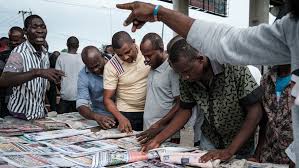APA – Lagos (Nigeria)
The report that Nigeria has sought assistance from the United States government to address critical issues affecting the country’s agricultural sector is one of the trending stories in Nigerian newspapers on Friday.
The punch reports that Nigeria has sought assistance from the United States government to address critical issues affecting the country’s agricultural sector.
Vice President Kashim Shettima initiated discussions during a meeting with the US Special Envoy for Global Food Security, Cary Fowler, as part of his diplomatic engagements in the United States of America recently.
“We seek the support of the United States Government, be it technical or otherwise, towards addressing challenges in our agricultural sector,” Shettima said in a statement.
He emphasised, “Mechanisation is essential – good quality seeds, fertilisation, improved agricultural practices, smart agriculture – these are the solutions we seek because our entire focus is on increasing yield and improving productivity. It goes beyond the mere acreage used for production.
“I am here, surrounded by other stakeholders armed with figures, facts, and knowledge, making this partnership easy and smooth sailing,” the Vice President stated.
He assured the US Special Envoy for Global Food Security of the Tinubu administration’s readiness to collaborate with relevant stakeholders, not only to enhance agricultural productivity in Nigeria but across Africa.
The newspaper says that the Nigerian Government’s oil revenue target for May dropped from N804bn to N223bn, representing about 72 per cent reduction in federal earnings; statistics from the Central Bank of Nigeria’s Monthly Economic Report for May 2023 seen by The PUNCH on Wednesday has shown.
According to the report; “oil revenue at N223bn for May was 36 per cent below receipts in the preceding month and below the monthly target of N804bn”.
The observed shortfall in oil revenue, according to CBN; was driven mainly by lower receipts from Petroleum Profit Tax and Royalties.
Gross federation earnings dropped as a result of lower oil and non-oil receipts, the report added.
At a total of N837bn, federation revenue was lower than the level in April by 16 per cent, and the budget by 53 per cent.
In terms of contribution, the report said non-oil revenue sources continued to dominate, accounting for 73.4 per cent of federation revenue in the review period.
At N614bn, non-oil receipt was 5.4 per cent less than the level in April, and 36 per cent below target.
The shortfall was largely attributed to lower collections from Company Income Tax, Value Added Tax, and Customs & Excise Duties, reflecting seasonality in the filing of tax returns by businesses in Nigeria.
The Guardian reports that the UN Children Fund (UNICEF) has called collaboration between the Federal and State Governments to address multiple health system challenges in Nigeria.
The UNICEF Deputy Representative in Nigeria, Mrs Rownak Khan, said this at the induction of the newly appointed Commissioners of Health in Nigeria themed “Navigating Health Leadership: From Promise to Impact” in Abuja.
Khan said that effective coordination at the federal and state levels was at the core of the kind of leadership required for Nigeria to effectively and sustainably address her multiple health system challenges.
She said that UNICEF believed that progress would remain elusive unless there was policy and implementation alignment between national and subnational entities.
Khan said that with a new government in place, it was the moment to reimagine the health sector for improved performance and outcomes.
“So far, the signals coming from the coordinating minister of health and social welfare and from various health commissioners indicate that the new dispensation brings with it a unique opportunity for innovation and efficiency in responding to the many challenges facing the health sector.
“We look forward to the concretization of government’s strategic direction in the health sector, especially the Sector Wide Approach (SWAP) proposed by the coordinating minister as a way of maximising the impact of development assistance to the country,’’ she said.
Khan pledged that UNICEF’s support to the federal and state ministries of health to further elaborate implement and track this and other policy initiatives.
The newspaper says that the Nigerian Railway Corporation has failed to reach its target of 90 cargo haulage trips monthly via the $1.5 billion Lagos-Ibadan standard gauge rail that was launched about two months ago.
This is just as importers, freight forwarders and Customs agents have abandoned the rail service over double handling charges from the loading terminal at Apapa port, to the rail service cost and the terminal offloading in Ibadan.
Also, since the arrival of the Lagos-Ibadan cargo train at Apapa Port with a sizeable number of export units of containers on October 29, from Moniya in Ibadan, it has not returned to Ibadan as of yesterday due to a lack of import units of containers to transport.
According to the National Bureau of Statistics (NBS), Foreign Trade in Goods Statistics second quarter 2023 report, Apapa port recorded 63.74 per cent of total imports into the country and 93.65 per cent of total exports. Over 90 per cent of these imports and exports were transported via trucks.
Other issues associated with the abandonment include lack of stakeholders and users’ sensitisation of the service, poor handling service of the Nigerian Railway Corporation (NRC), and terminal logistics at Ibadan, leading to delay in cargo delivery.
Recall that during the commissioning of the standard gauge rail service from Apapa Port to Ibadan on September 12, the Minister of Transportation, Saidu Alkali, and the Lagos District Manager of NRC, Augustine Arisa, said cargo movements via the standard gauge rail is now fully operational.
They assured that the freight services would start with three coaches of 30 wagons per day, totaling 90 trips per month, which will increase to nine trips per day and 270 trips per month when the Customs scanner building is removed.
GIK/APA


